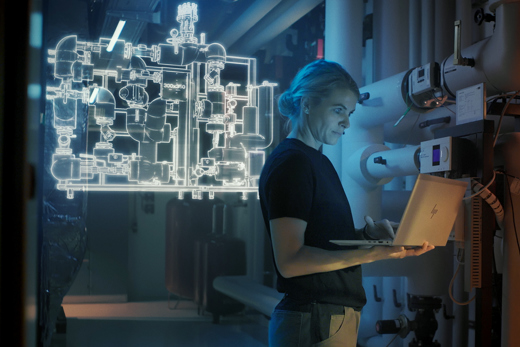
Dive Into the Future: Digitalization in District Energy Solutions
Supercharge your district energy system. Discover Danfoss's digitalization insights now.
Article: Perspectives on key digitalization challenges within the district energy sector
In today's world, district energy systems play a crucial role in meeting the rising demand for thermal energy while decarbonizing our energy supply. To unlock their full potential, digital solutions are essential, but they come with their own set of challenges. In this article, we explore the hurdles and solutions in the digitalization of district heating systems.
Abstract: In November 2023, the final report from the International Energy Agency (IEA) District Heating and Cooling (DHC) task share project Digitalization of District Heating and Cooling was published.
The aim of the project was promoting the opportunities arising from integrating digital processes into different parts of DHC systems and end-user heating installations. It also collected use cases of already available digitalization solutions to demonstrate the impact digital solutions have on the system operation, both on existing systems going through a modernization cycle as well as in new systems.
The consortium behind the project was carefully chosen to include the key research institutions, universities and digital solution providers in the DHC sector to ensure the most holistic view on the current market status, as well as for giving collective perspective on the key challenges for the future development of digital solutions within the district energy sector.
Challenges addressed in the article:
- Heterogeneity of DHC systems: The district energy sector is characterized by local uniqueness and operation, with varying conditions and fragmented markets, making it challenging to develop a standardized digital solution that fits all systems and agendas.
- Lack of standards for DHC: The lack of standards in DHC digitalization hampers progress, highlighting the importance of standardized vocabulary, data protocols, and ontology for interoperability and consistent data interpretation.
- Vendor-lock in and interoperability: Danfoss is developing a modular-based platform, Leanheat®, to overcome vendor-lock in and limited interoperability, promoting adaptability and scalability in district energy digitalization.
- Need for robust and resilient control architectures: Digitalizing district energy requires robust and resilient architectures to mitigate cyber risks and ensure stable supply, incorporating fallback options for worst-case scenarios.
- GDPR compliance: GDPR regulations aim to protect personal data while allowing its use in fulfilling societal functions, like DHC digitalization, as long as it follows principles like data minimization and consent.
- Safety and security of IT systems: Ensuring the safety and security of critical infrastructures like DHC systems in the face of cyber threats requires vigilant software development teams and proactive security measures throughout the development lifecycle.
- Lack of reference datasets and benchmarks: Variations in climate, geography, and heat sources makes benchmarking difficult, but having these resources as one of the parameters for evaluating available solutions would greatly benefit utilities in making informed decisions for their digitalization systems.
In summary, the district energy sector faces challenges related to system heterogeneity, lack of standards, vendor-lock in, cyber risks, GDPR compliance, and the need for reference datasets. To delve deeper into these challenges and explore potential solutions, we invite you to download the full article.
Meet the author:
Want to know more about district energy solutions?

Digital twin technology for substations: Danfoss Titan™
Discover Danfoss Titan™: a groundbreaking solution with digital twin technology.
Achieve correct commissioning, enhanced performance, and the lowest return temperature. With intuitive cloud commissioning and continuous optimization, you ensure optimal settings for different working conditions.
Enjoy 1-3 °C reduction in return temperature, actionable insights, reliability, and the shortest commissioning time. Experience energy efficiency and savings like never before.

Leanheat®: End to end software suite & services
End-to-end optimization for district energy and buildings.
From the planning phase to real-time monitoring and control, Danfoss Leanheat® solutions and services unlock the door to optimization at each level of your business with powerful results:
- Optimization leads to significant energy and maintenance savings
- Easy installation ensures quick and seamless system retrofitting - and fast-track savings
- Building occupants experience optimal climate comfort

Enter a new dimension of district energy
Discover ultimate network resilience and energy efficiency with Danfoss Titan™ for continuous optimization of substation performance. Watch the video to learn more or find more information here.
